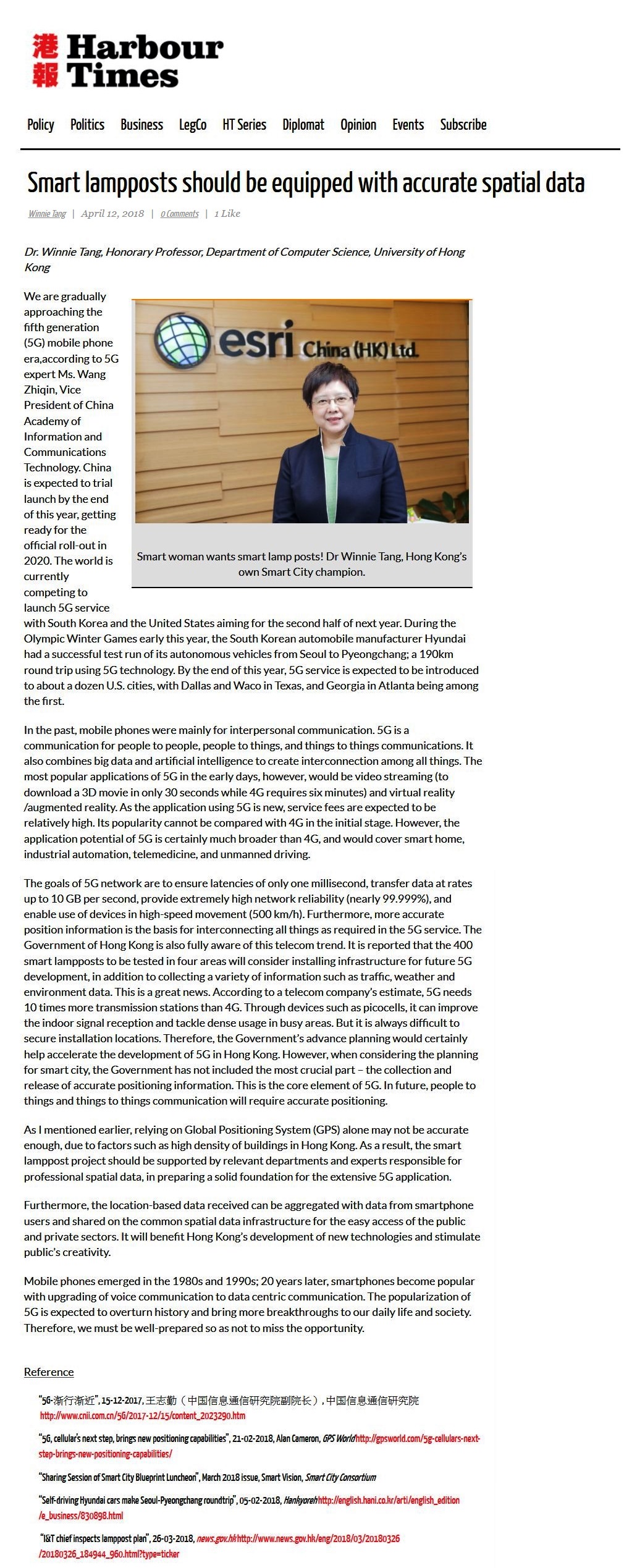網上版請按此

Smart lampposts should be equipped with accurate spatial data
We are gradually approaching the fifth generation (5G) mobile phone era,according to 5G expert Ms. Wang Zhiqin, Vice President of China Academy of Information and Communications Technology. China is expected to trial launch by the end of this year, getting ready for the official roll-out in 2020. The world is currently competing to launch 5G service with South Korea and the United States aiming for the second half of next year. During the Olympic Winter Games early this year, the South Korean automobile manufacturer Hyundai had a successful test run of its autonomous vehicles from Seoul to Pyeongchang; a 190km round trip using 5G technology. By the end of this year, 5G service is expected to be introduced to about a dozen U.S. cities, with Dallas and Waco in Texas, and Georgia in Atlanta being among the first.
In the past, mobile phones were mainly for interpersonal communication. 5G is a communication for people to people, people to things, and things to things communications. It also combines big data and artificial intelligence to create interconnection among all things. The most popular applications of 5G in the early days, however, would be video streaming (to download a 3D movie in only 30 seconds while 4G requires six minutes) and virtual reality /augmented reality. As the application using 5G is new, service fees are expected to be relatively high. Its popularity cannot be compared with 4G in the initial stage. However, the application potential of 5G is certainly much broader than 4G, and would cover smart home, industrial automation, telemedicine, and unmanned driving.
The goals of 5G network are to ensure latencies of only one millisecond, transfer data at rates up to 10 GB per second, provide extremely high network reliability (nearly 99.999%), and enable use of devices in high-speed movement (500 km/h). Furthermore, more accurate position information is the basis for interconnecting all things as required in the 5G service. The Government of Hong Kong is also fully aware of this telecom trend. It is reported that the 400 smart lampposts to be tested in four areas will consider installing infrastructure for future 5G development, in addition to collecting a variety of information such as traffic, weather and environment data. This is a great news. According to a telecom company’s estimate, 5G needs 10 times more transmission stations than 4G. Through devices such as picocells, it can improve the indoor signal reception and tackle dense usage in busy areas. But it is always difficult to secure installation locations. Therefore, the Government's advance planning would certainly help accelerate the development of 5G in Hong Kong. However, when considering the planning for smart city, the Government has not included the most crucial part – the collection and release of accurate positioning information. This is the core element of 5G. In future, people to things and things to things communication will require accurate positioning.
As I mentioned earlier, relying on Global Positioning System (GPS) alone may not be accurate enough, due to factors such as high density of buildings in Hong Kong. As a result, the smart lamppost project should be supported by relevant departments and experts responsible for professional spatial data, in preparing a solid foundation for the extensive 5G application.
Furthermore, the location-based data received can be aggregated with data from smartphone users and shared on the common spatial data infrastructure for the easy access of the public and private sectors. It will benefit Hong Kong's development of new technologies and stimulate public's creativity.
Mobile phones emerged in the 1980s and 1990s; 20 years later, smartphones become popular with upgrading of voice communication to data centric communication. The popularization of 5G is expected to overturn history and bring more breakthroughs to our daily life and society. Therefore, we must be well-prepared so as not to miss the opportunity.
Dr. Winnie Tang
Honorary Professor, Department of Computer Science, The University of Hong Kong